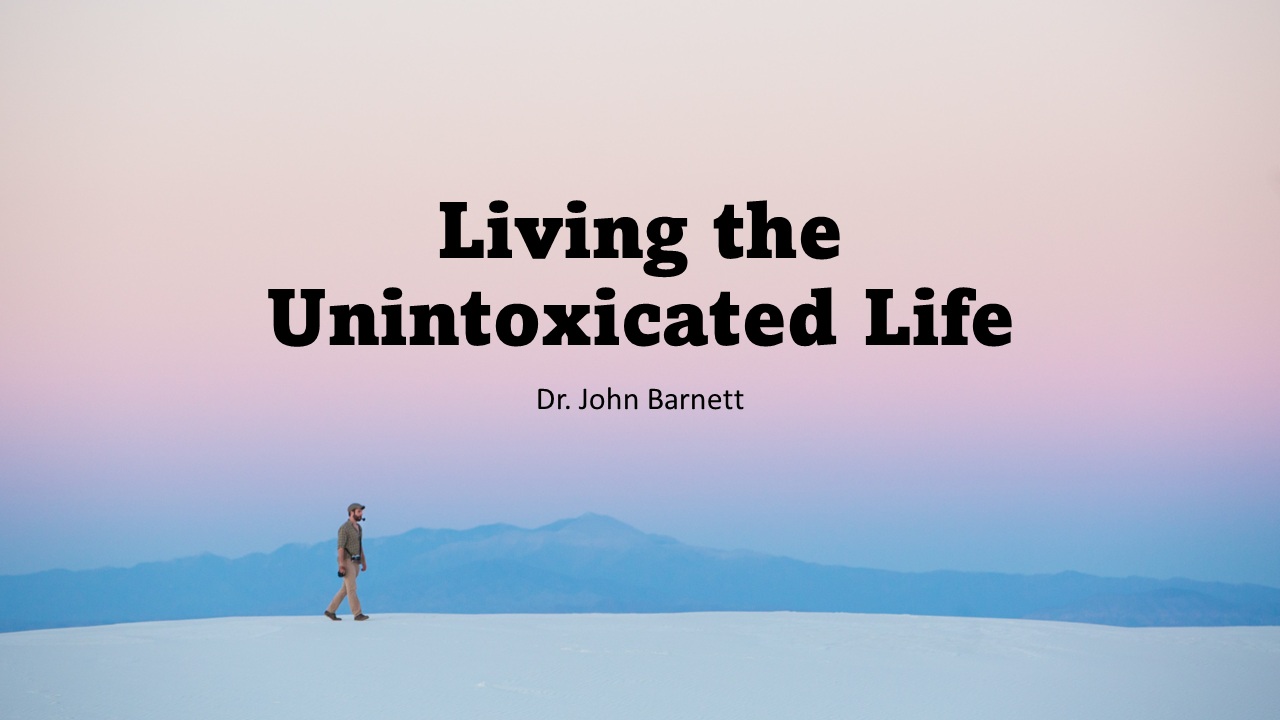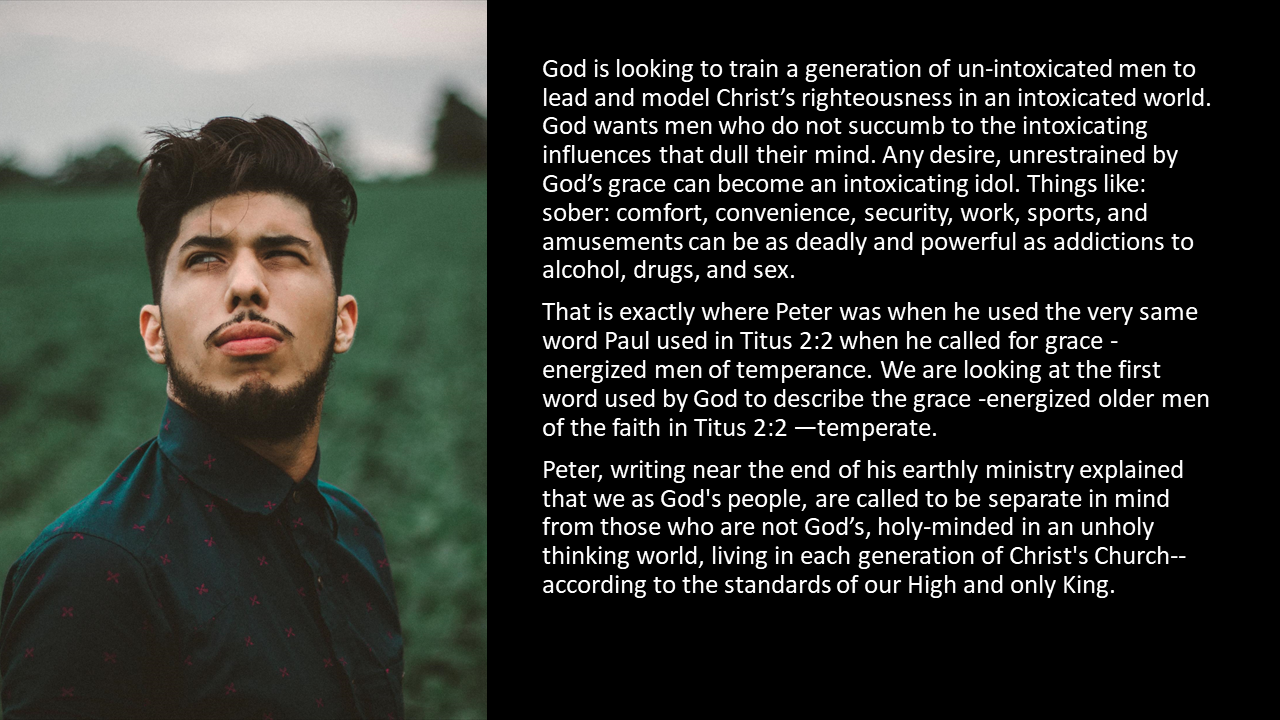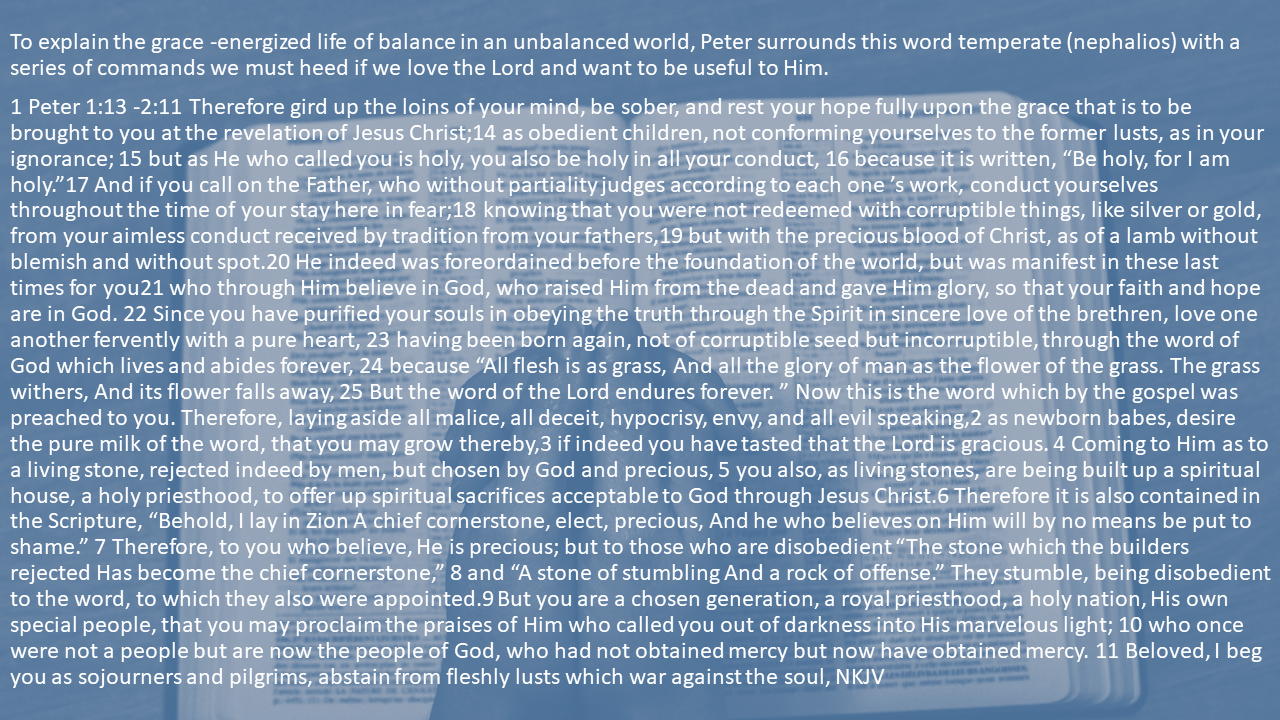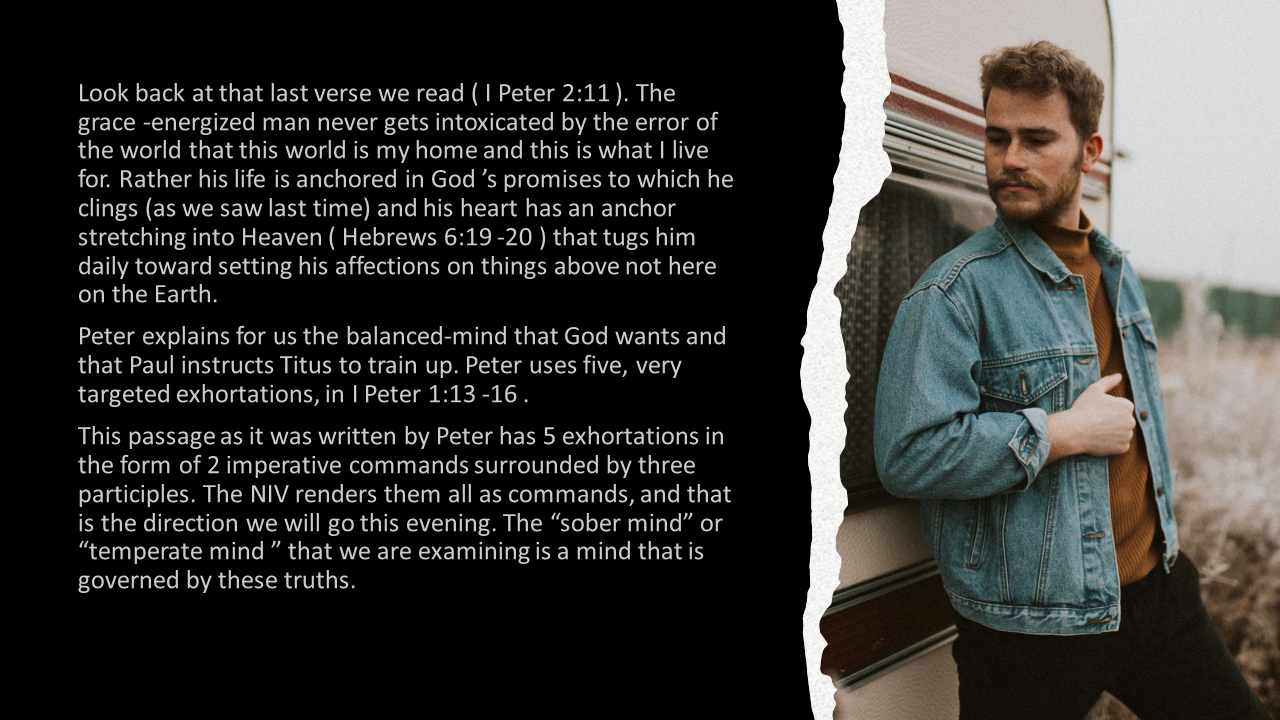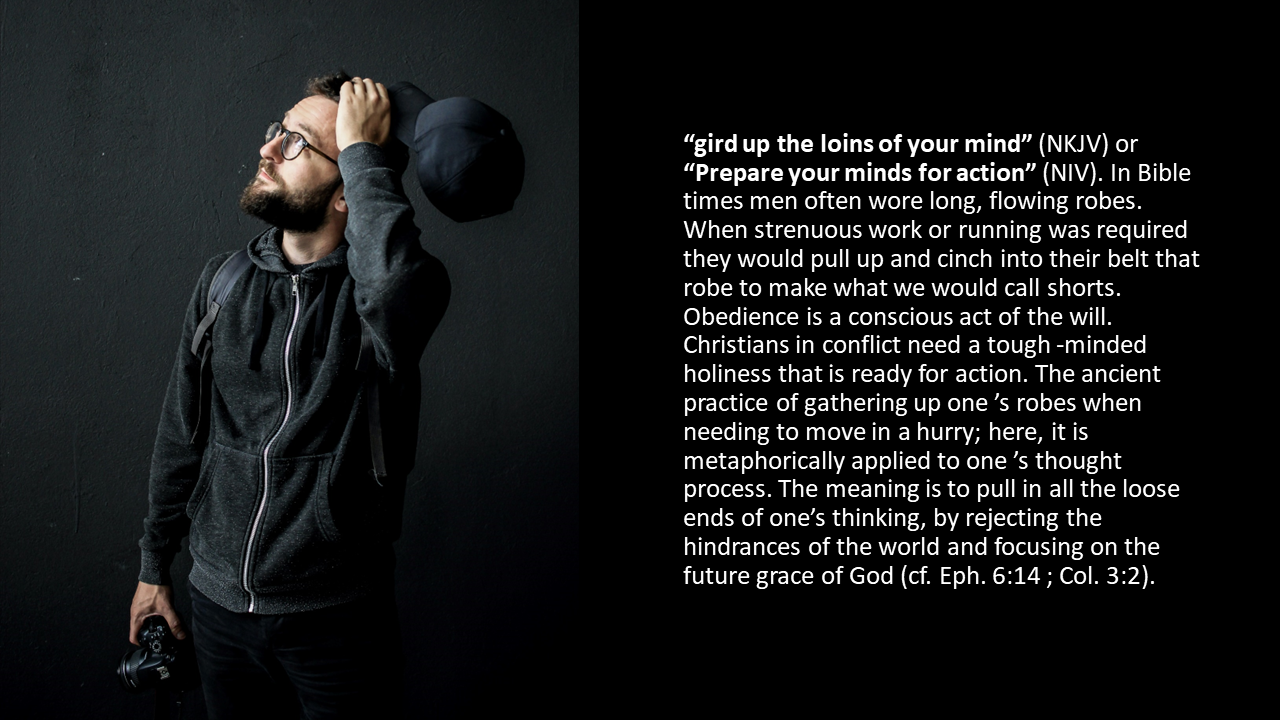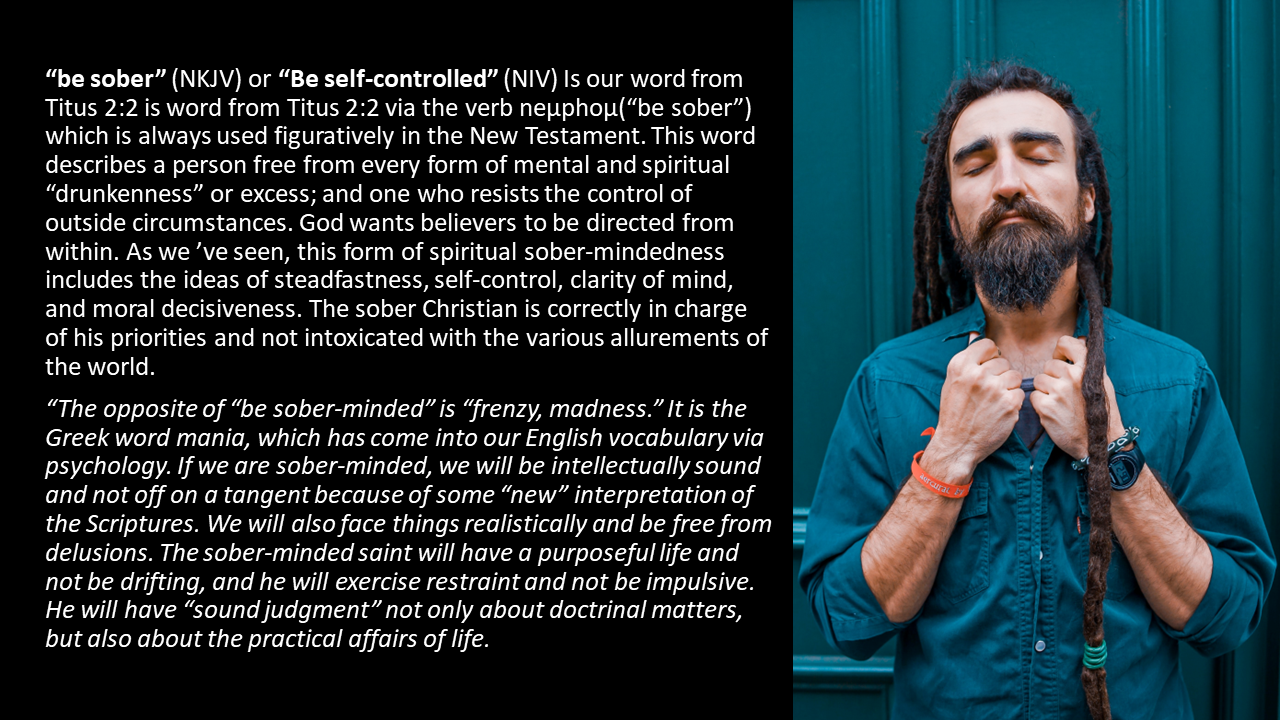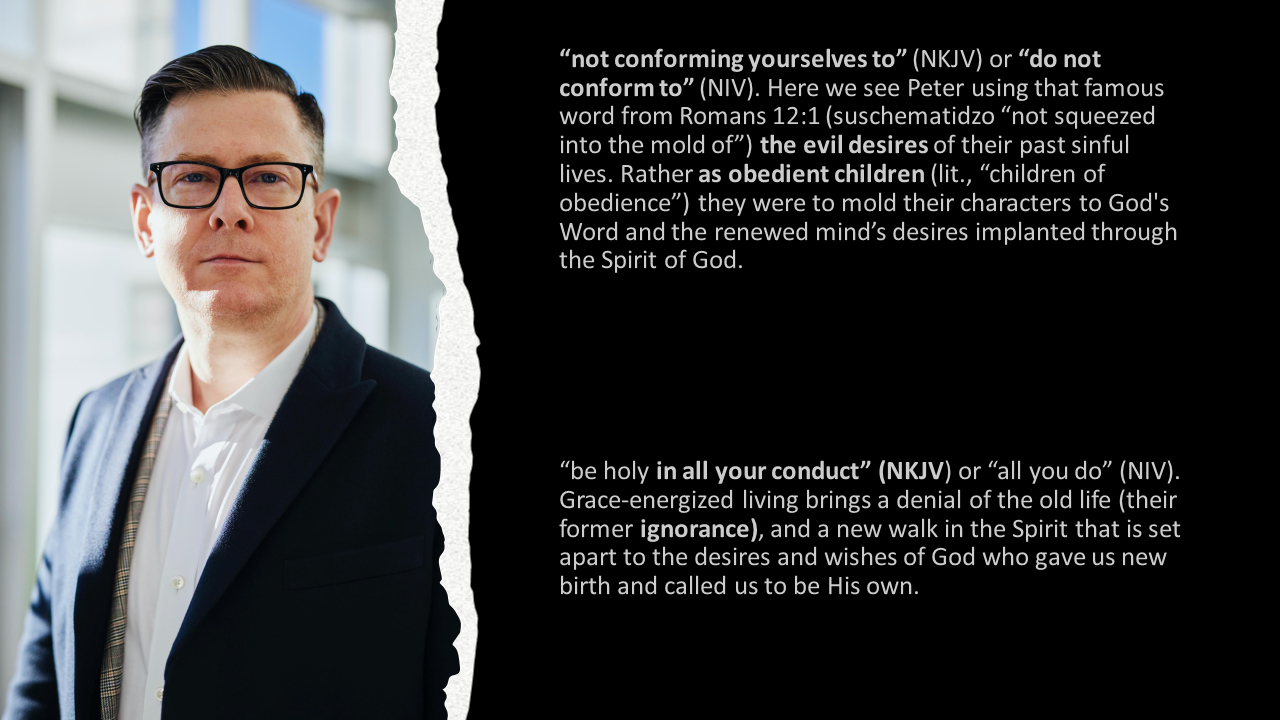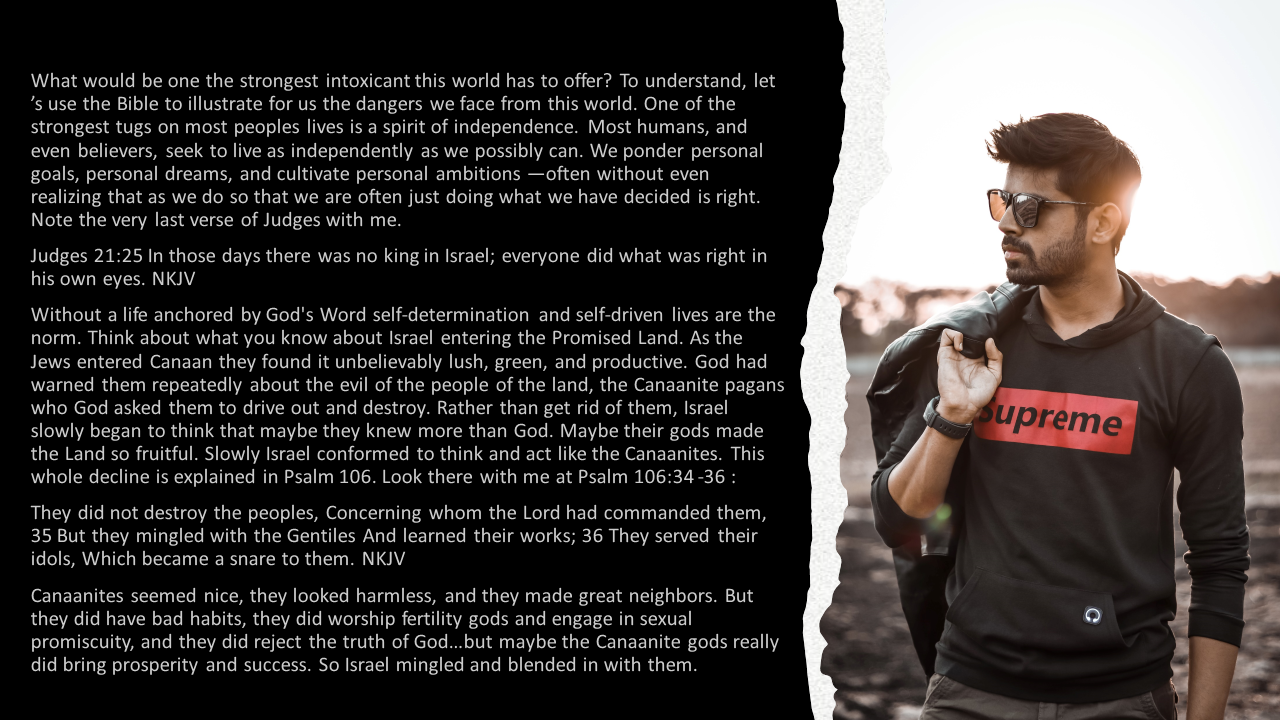GEM-04
071111PM
God is looking to train a generation of un-intoxicated men to lead and model Christ’s righteousness in an intoxicated world. God wants men who do not succumb to the intoxicating influences that dull their mind. Any desire, unrestrained by God’s grace can become an intoxicating idol. Things like: sober: comfort, convenience, security, work, sports, and amusements can be as deadly and powerful as addictions to alcohol, drugs, and sex.
That is exactly where Peter was when he used the very same word Paul used inTitus 2:2 when he called for grace-energized men of temperance. We are looking at the first word used by God to describe the grace-energized older men of the faith in Titus 2:2—temperate.
Peter, writing near the end of his earthly ministry explained that we as God’s people, are called to be separate in mind from those who are not God’s, holy-minded in an unholy thinking world, living in each generation of Christ’s Church–according to the standards of our High and only King Jesus.
Living the Balanced Life According to Peter
To explain the grace-energized life of balance in an unbalanced world, Peter surrounds this word temperate (nephalios) with a series of commands we must heed if we love the Lord and want to be useful to Him.
1 Peter 1:13-2:11 Therefore gird up the loins of your mind, be sober, and rest your hope fully upon the grace that is to be brought to you at the revelation of Jesus Christ;14 as obedient children, not conforming yourselves to the former lusts, as in your ignorance; 15 but as He who called you is holy, you also be holy in all your conduct, 16 because it is written, “Be holy, for I am holy.”17 And if you call on the Father, who without partiality judges according to each one’s work, conduct yourselves throughout the time of your stay here in fear;18 knowing that you were not redeemed with corruptible things, like silver or gold, from your aimless conduct received by tradition from your fathers,19 but with the precious blood of Christ, as of a lamb without blemish and without spot.20 He indeed was foreordained before the foundation of the world, but was manifest in these last times for you21 who through Him believe in God, who raised Him from the dead and gave Him glory, so that your faith and hope are in God. 22 Since you have purified your souls in obeying the truth through the Spirit in sincere love of the brethren, love one another fervently with a pure heart, 23 having been born again, not of corruptible seed but incorruptible, through the word of God which lives and abides forever, 24 because “All flesh is as grass, And all the glory of man as the flower of the grass. The grass withers, And its flower falls away, 25 But the word of the Lord endures forever.” Now this is the word which by the gospel was preached to you. Therefore, laying aside all malice, all deceit, hypocrisy, envy, and all evil speaking,2 as newborn babes, desire the pure milk of the word, that you may grow thereby,3 if indeed you have tasted that the Lord is gracious. 4 Coming to Him as to a living stone, rejected indeed by men, but chosen by God and precious, 5 you also, as living stones, are being built up a spiritual house, a holy priesthood, to offer up spiritual sacrifices acceptable to God through Jesus Christ.6 Therefore it is also contained in the Scripture, “Behold, I lay in Zion A chief cornerstone, elect, precious, And he who believes on Him will by no means be put to shame.” 7 Therefore, to you who believe, He is precious; but to those who are disobedient “The stone which the builders rejected Has become the chief cornerstone,” 8 and “A stone of stumbling And a rock of offense.” They stumble, being disobedient to the word, to which they also were appointed.9 But you are a chosen generation, a royal priesthood, a holy nation, His own special people, that you may proclaim the praises of Him who called you out of darkness into His marvelous light; 10 who once were not a people but are now the people of God, who had not obtained mercy but now have obtained mercy. 11 Beloved, I beg you as sojourners and pilgrims, abstain from fleshly lusts which war against the soul, NKJV
Grace-Energized Men Understand that they are Pilgrims
Look back at that last verse we read (I Peter 2:11). The grace-energized man never gets intoxicated by the error of the world that this world is my home and this is what I live for. Rather his life is anchored in God’s promises to which he clings (as we saw last time) and his heart has an anchor stretching into Heaven (Hebrews 6:19-20) that tugs him daily toward setting his affections on things above not here on the Earth.
Peter explains for us the balanced-mind that God wants and that Paul instructs Titus to train up. Peter uses five, very targeted exhortations, in I Peter 1:13-16.
This passage as it was written by Peter has 5 exhortations in the form of 2 imperative commands surrounded by three participles. The NIV renders them all as commands, and that is the direction we will go this evening. The “sober mind” or “temperate mind” that we are examining is a mind that is governed by these truths.
(1) “gird up the loins of your mind” (NKJV) or “Prepare your minds for action” (NIV). In Bible times men often wore long, flowing robes. When strenuous work or running was required they would pull up and cinch into their belt that robe to make what we would call shorts. Obedience is a conscious act of the will. Christians in conflict need a tough-minded holiness that is ready for action. The ancient practice of gathering up one’s robes when needing to move in a hurry; here, it is metaphorically applied to one’s thought process. The meaning is to pull in all the loose ends of one’s thinking, by rejecting the hindrances of the world and focusing on the future grace of God (cf. Eph. 6:14; Col. 3:2).
(2) “be sober” (NKJV) or “Be self-controlled” (NIV) Is our word from Titus 2:2 is word from Titus 2:2 via the verb neµphoµ (“be sober”) which is always used figuratively in the New Testament. This word describes a person free from every form of mental and spiritual “drunkenness” or excess; and one who resists the control of outside circumstances. God wants believers to be directed from within. As we’ve seen, this form of spiritual sober-mindedness includes the ideas of steadfastness, self-control, clarity of mind, and moral decisiveness. The sober Christian is correctly in charge of his priorities and not intoxicated with the various allurements of the world.
“The opposite of “be sober-minded” is “frenzy, madness.” It is the Greek word mania, which has come into our English vocabulary via psychology. If we are sober-minded, we will be intellectually sound and not off on a tangent because of some “new” interpretation of the Scriptures.
We will also face things realistically and be free from delusions. The sober-minded saint will have a purposeful life and not be drifting, and he will exercise restraint and not be impulsive. He will have “sound judgment” not only about doctrinal matters, but also about the practical affairs of life.[1][1]
(3) “rest your hope fully” (NKJV) or “Set your hope fully”(NIV). This balanced mind and holy life demands great determination. A believer’s hope is to be set completely, unwaveringly, and without reservation solely by faith upon God’s grace. Only His grace can energize an anchored mind.
(4) “not conforming yourselves to” (NKJV) or “do not conform to” (NIV). Here we see Peter using that famous word from Romans 12:1 (suschematidzo “not squeezed into the mold of”) the evil desires of their past sinful lives. Rather as obedient children (lit., “children of obedience”) they were to mold their characters to God’s Word and the renewed mind’s desires implanted through the Spirit of God.
(5) “be holy in all your conduct” (NKJV) or “all you do” (NIV). Grace-energized living brings a denial of the old life (their formerignorance), and a new walk in the Spirit that is set apart to the desires and wishes of God who gave us new birth and called us to be His own.
What would be one the strongest intoxicant this world has to offer? To understand, let’s use the Bible to illustrate for us the dangers we face from this world. One of the strongest tugs on most peoples lives is a spirit of independence. Most humans, and even believers, seek to live as independently as we possibly can. We ponder personal goals, personal dreams, and cultivate personal ambitions—often without even realizing that as we do so that we are often just doing what we have decided is right. Note the very last verse of Judges with me.
Judges 21:25 In those days there was no king in Israel; everyone did what was right in his own eyes. NKJV
Without a life anchored by God’s Word self-determination and self-driven lives are the norm. Think about what you know about Israel entering the Promised Land. As the Jews entered Canaan they found it unbelievably lush, green, and productive. God had warned them repeatedly about the evil of the people of the land, the Canaanite pagans who God asked them to drive out and destroy.
Rather than get rid of them, Israel slowly began to think that maybe they knew more than God. Maybe their gods made the Land so fruitful. Slowly Israelconformed to think and act like the Canaanites. This whole decline is explained in Psalm 106. Look there with me at Psalm 106:34-36:
They did not destroy the peoples, Concerning whom the Lord had commanded them, 35 But they mingled with the Gentiles And learned their works; 36 They served their idols, Which became a snare to them. NKJV
Canaanites seemed nice, they looked harmless, and they made great neighbors. But they did have bad habits, they did worship fertility gods and engage in sexual promiscuity, and they did reject the truth of God…but maybe the Canaanite gods really did bring prosperity and success. So Israel mingled and blended in with them.
God’s Word warns us that each of us who know Jesus are…
Living Among Canaanites Today
The Canaanite snare to Israel that is played out in the book of Judges is probably a good picture of the autonomous lifestyles many American professing Christians are living these days.
The online source for many Americans named Wikipedia really does capture the essence of the current American’s thinking:
“In general, the American dream can be defined as being the opportunity and freedom for all citizens to achieve their goals and become rich and famous if only they work hard enough.”
This statement of the “American Dream” is the most frank definition of what may actually be our deeply rooted national form of idolatry. As believers we have become so American that we think God and the American dream somehow fit together. We are so steeped in our culture and life that we fail to fear the “Canaanite” danger all around us. We are in the very same dangerous place as Israel in the times of the Judges.
Our society offers us all manner of consumer goods, pleasure, travel and enjoyment, the good things of life–but we are asked to be “tolerant” of (and eventually to buy into) the pagan idolatry which is everywhere around us. And when we do so, and the more we do so—then the terrible sickness and blindness of Revelation 3 takes hold of our lives.
Look with me at Christ’s last letter to His church, the ones in Laodicea:
Revelation 3:14-22 “And to the angel of the church of the Laodiceans write, ‘These things says the Amen, the Faithful and True Witness, the Beginning of the creation of God:15 “I know your works, that you are neither cold nor hot. I could wish you were cold or hot.16 “So then, because you are lukewarm, and neither cold nor hot, I will vomit you out of My mouth.17 “Because you say, ‘I am rich, have become wealthy, and have need of nothing’—and do not know that you are wretched, miserable, poor, blind, and naked—18 “I counsel you to buy from Me gold refined in the fire, that you may be rich; and white garments, that you may be clothed, that the shame of your nakedness may not be revealed; and anoint your eyes with eye salve, that you may see.19 “As many as I love, I rebuke and chasten. Therefore be zealous and repent.20 “Behold, I stand at the door and knock. If anyone hears My voice and opens the door, I will come in to him and dine with him, and he with Me.21 “To him who overcomes I will grant to sit with Me on My throne, as I also overcame and sat down with My Father on His throne.22 “He who has an ear, let him hear what the Spirit says to the churches.” ’ ” NKJV
We live in the most intoxicating time in history. We live around the constant allurements of wealth, comfort and the false promises of security. When we give in to the “Canaanite virus” we slowly detach from the closeness to Christ and His church He calls us to and we drift around seeking our goals, plans, and ambitions.
One of the clearest signs of the Canaanite sickness in the church is the growing detached lifestyles we pursue. Listen to this piercing analysis of one very careful thinker.
“The fascinating book Bowling Alone by Robert D. Putnam (Simon & Schuster 2000) documents the erosion of social groups, associations, connectivity, social support groups, and close personal friendships in recent decades. We are increasingly a nation of disconnected, isolated, lonely individuals.
This is especially bad news for the church of Jesus Christ which is called to bond together locally on an intimate basis–closer to one another than one finds in most ordinary family groups. For the church the old saying “united we stand, divided we fall” is especially relevant. As our culture and American society fall apart, it is most important for us Christians to take vigorous steps in the opposite direction from the trends in our culture! If we each deal with the microcosm of our individual lives under God, we can leave the repair of the macrocosm to God.
In reading the letters of the Apostle Paul one can’t help note the very large number of Christian brothers the Apostle knew, prayed for, and cared for–even though they were scattered about all over the Roman Empire. They were all “family.” We see Paul frequently stopping to pray for them or send them greetings though they lived hundreds of miles apart. It was not exactly as if he had nothing else to do! Today it is not likely we have any clue about our Christians in other congregations even when neighboring churches are just down the block. And next door neighbors? Many of us have no clue about them at all.
When the collective spiritual standards of a local church slowly slip away, the flame in individual hearts dies as well. There is a cure to this situation of gradual decline in the Christian community, but it depends on individuals who will resist the status quo, begin repenting on behalf of the rest of all of us, and renewing our own close daily walk with God by rearranging our priorities.
God has not given us Christians a plot of land, a temple, an earthly inheritance–things He did give to Israel in perpetuity. But He has given each of us a spiritual sphere of influence–the kingdom of our individual lives. Our invisible influence amongst our families, our friends, at church, at work, thrives only when we place ourselves under the authority and rule of Jesus, the King of kings. When Jesus rules in and through us, living His endless life through us, a lasting legacy is laid up for us in heaven–even though our position in the present world system may be obscure or unknown (Hebrews 11:32-40)[2][2].
How do we avoid the Canaanite tendencies of the “American Dream”? The best way to start is to remember again the seven ways Paul taught us to protect our Biblical contentment from I Timothy 6. Here they are again, if these aren’t yet noted, why don’t you jot them into your Bibles?
- Always remember things are only temporary. 1 Timothy 6:7For we brought nothing into this world, and it is certain we can carry nothing out.
- Only seek necessities, wait for the rest. 1 Timothy 6:8 And having food and clothing, with these we shall be content.
- Avoid a consuming desire for prosperity.1 Timothy 6:9-10 But those who desire to be rich fall into temptation and a snare, and into many foolish and harmful lusts which drown men in destruction and perdition. 10 For the love of money is a root of all kinds of evil, for which some have strayed from the faith in their greediness, and pierced themselves through with many sorrows.
- Flee materialism. 1 Timothy 6:11 But you, O man of God, flee these things and pursue righteousness, godliness, faith, love, patience, gentleness.
- Cling to eternal life. 1 Timothy 6:12, 15, 19 Fight the good fight of faith, lay hold on eternal life, to which you were also called and have confessed the good confession in the presence of many witnesses. 15 which He will manifest in His own time, He who is the blessed and only Potentate, the King of kings and Lord of lords, 16 who alone has immortality, dwelling in unapproachable light, whom no man has seen or can see, to whom be honor and everlasting power. Amen. 19 storing up for themselves a good foundation for the time to come, that they may lay hold on eternal life.
- Pin your hopes on God. 1 Timothy 6:17 Command those who are rich in this present age not to be haughty, nor to trust in uncertain riches but in the living God, who gives us richly all things to enjoy. (I hope we have enough to…I hope that this investment will…I hope this job will last…)
- Give until it hurts. 1 Timothy 6:18 Let them do good, that they be rich in good works, ready to give, and willing to share.
Grace-energized men live a balanced life while surrounded by people who are driven back and forth by fads, obsessions, trivial pursuits, lusts, and emptiness. He stays true to the Lord while living in the midst of the Canaanites of this world.
He is temperate, the first of six character traits that describe a man of God, a man God uses, and a life that God rewards. I challenge each of you older men in this congregation to heed God’s call to maintain a balanced life in an increasingly Canaanite culture.
APPENDIX:
A Balanced View of Troubles
Another strength of a grace-energized mind is stability. God’s Word makes it clear that every believer will go through times in life marked by distorted thought, blurred thinking, and temporary confusion. Part of the fall is living in a fallen body with a mind that needs to be often renewed. Usually these confusing times of blurred thoughts come when our lives get piled high with problems, troubles, unexpected crises or just plain exhaustion.
When ever you face confusing times of blurred thinking remember Elijah. Confusion reigned in his life and God recorded two amazing details in the New Testament that should always strengthen us in similar times:
- Elijah was one of the mightiest saints in God’s Word (he was raptured to Heaven without seeing death, he came back to stand with Jesus on the Mt. of Transfiguration, and he is billed as one of the greatest examples of faith-filled praying in step with God’s Spirit.
- Elijah was just like us New Testament saints. Yes, in James 5:17, the pastor of the first New Testament church in Jerusalem, our Lord’s own brother James, under the inspiration of the Holy Spirit said that Elijah was a man with “a nature like ours”.
So make an equation out of those two truths and what happens next. Elijah was very close to God, very powerfully full of faith and obedience plus we are just like him. That means we can relate to all the struggles he went through and that his great walk with the Lord did not keep him from having.
In I Kings 19:4 Elijah the mighty man of God (just like David the man after God’s own heart)—came to a point where he couldn’t cope with life. He got overwhelmed to the point that he felt like life was not worth living, he wanted to die and end all the pressures he couldn’t stand any more. He felt all alone in standing for God, while God knew there were 7,000 others (v.18) who also were resisting the false worship of Baal. What can we see from the Elijah equation?
First that Elijah’s bottoming out was a predictable outcome of the times he faced. For over three years Elijah had lived under the constant stress of Jezebel’s evil campaign to rid the land of true believers. Then came the “mountain top” experience of Mt. Carmel and the dramatic victory God gave over the false prophets, answering from Heaven with fire. But after all that Elijah fell apart. He became totally unable to go on physically, emotionally, and spiritually. He actually says that he “had enough” in v. 4. Elijah was depressed and frozen.
So what did God do with him? This time of depression was temporary because God prescribed proper rest, proper nutrition, and quality time with God. As soon as those three areas were dealt with Elijah returns as the clear-minded, obedient servant of the Lord he had been before. It is very important to note that God brought a faithful friend who was loyal and close into Elijah’s life also at this time, named Elisha (v. 21).
The lesson is that even the best of us will go through dark times of life, confusing times when we get “down” emotionally. In fact with certain circumstances such times can almost be predicted. But they are always momentary compared to the direction and focus of our lives which grace-energized balanced thinking reigns.
A Balanced View of Life
Grace-energized men are balanced emotionally. He doesn’t swing from pole to pole in emotional tangents. He displays a strong sense of security in Christ’s will that leads to an inner peace and tranquility. In an increasingly obsessive and compulsive world he stands out. For example, as this man of grace-energized balance looks at life in 21st Century America he testifies that he is not staking his life on the future prosperity of this world, rather he is a ‘pilgrim and stranger’ here. God has never wanted his children to find their security in the nation they live in. As believers we are not called to “save”America, any more than Paul was called to save Rome. Paul commanded us to “honor the King” but he never advised the believers to do what ever it took to ‘save Rome’.
Jesus warned us not to clean up the outside of the cup, it is the inside (the hearts) of men and women that need changing. Grace-energized thinking makes us realize that the most powerful way we can impact our culture and nation is to be all that God asks us to be in His Word. As we live out our calling we impact the people in our world and see them changing one-by-one.
Life is temporary and grace-energized balance in life keeps that truth before our minds. When Paul was teaching the new saints in Thessalonica he warned them about two extremes—one group seems to have already checked out of society, stopped working and were just waiting for Christ’s coming. Paul said, get back into the flow of life, work and plan like you are going to live out a full life, but do so looking up every day for Christ’s return (II Thessalonians 3). The other group seems to have bought the false security of the world that promises ‘peace and safety’ (I Thes. 5:2-3)
Paul identified four objectives for Titus as he taught the older men:
- MAINTAINING A BALANCED LIFE IN AN OBSESSIVE-COMPLUSIVE WORLD
Stay Sober – Don’t Inhale.
Now you ask, what is the poison? Can it be analyzed for content? Yes, clearly… Five deadly elements make up this killer poison gas [Chuck Colson has found these five:].
Poison gas # 1 Secularism
Secularism – As an adjective, sec = “of this world” or “or the present age”.
ü It’s the idea of life consists of merely the ‘here and now’, seize the moment, ‘grab the gusto’, only 60 around once…
ü The results or effects are: instant gratification needed in sex, food, cars, vacation, clothes, drugs, things…. It’s the motivation for all crime: “If I want what I want when I want it, why not take it!”
ü It’s the exaltation and desperate lunge for the momentary at the expense of the eternal.
Poison gas # 2 deconstructionism
Deconstructionism is to make society Antihistorical:
ü This is the curse of our schools. It is currently called “revisionism”.
ü No objective truth, so-
ü No objective meaning to language, literature, etc.
Result: look at the movies:
ü Dancing with Wolves – dismantles history and rewrites it to suit secularist.
ü Robin Hood – Costner finds the skill of Azeem in medicine, science and ethics to be superior. But, where did a Moslem come from in Sherwood Forest? It’s rewriting history until it’s eroded to meaninglessness.
Did you know Genesis is history? God wants you to know how you and everything else got here! Sin, government, the family and all! Have you been carelessly sniffing this poison?
Poison gas # 3 Naturalism
Naturalism (not humanism – we are past the man centered, now it is nature centered!) If evolution were true then all life came from the same cosmic soup so owls, whales, trees and people are of equal value!
WATCH OUT. Creationism was a doctrine God established!
Poison gas # 4:Utopianism
Utopianism – better and better. All are good basically, but it’s why: Hitler and holocaust, Two world wars, Genocide, serial killers, rape, greed, horror and undesirable evil? Because all of us are victims.
WATCH OUT for blaming how you are on your parents, education, onVietnam, poverty, etc. Start with real problem of personal sin…
Poison gas # 5 Pragmatism
Pragmatism – If it works it’s okay! Therefore, Satan has made moral relativism the law so all humanity seems to have both feet firmly planted in mid-air and is lost in the cosmos without meaning or purpose…. What’s the solution?
1 Pet. 5 (turn there please)
- 5-11 Divide into three crucial points of truth.
- 8-9 The warning (watch out)
- “sober” – don’t inhale, don’t get intoxicated with the: moral relativism – not relative but absolutes; I think…my rights. Materialism – not here but heaven; hear Thou…me-ism – no me but Christ; me first. Secularism – not this moment but the eternal; live for now.
- “stay awake”: be vigilant, Rev. 3:2, watch for Christ; Phil. 3:20;Rom. 13:11-14; I Thess. 3:13.
- “stand firm”: resist, Eph. 6:13 – withstand; James 4:17 – resist devil; don’t yield to the poison, breathe the air of heaven. Turn off TV, stereo, radio, and read, read, read. Pray, pray, pray.
[1][1]Wiersbe, Warren W., The Bible Exposition Commentary, (Wheaton, IL: Victor Books) 1997.
[2][2] Lambert Dolphin email NL#80, 10/27/07.

